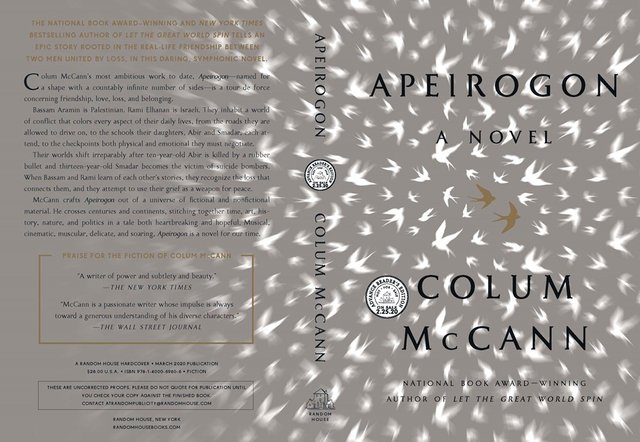Review: Colum McCann - 'Apeirogon'

<blockquote>A rubber bullet, when shot from a metal tube on the end of an M-16, leaves the barrel of the gun at more than one hundred miles per hour. The bullets are large enough to be seen but too fast to be avoided. They were tested first in Northern Ireland, where the British called them knee-knockers: they were designed to be fired at the ground, then bounce up and hit the legs of rioters.</blockquote>
<blockquote>The soldiers called the bullets Lazarus pills: when possible, they could be picked up and used again.</blockquote>
<blockquote>The room had two large sofas, a long table and eight red chairs. Nobody took the sofas at first. They sat at opposite ends of the table. The language that they might use for each other was already fraught: Muslim, Arab, Christian, Jew, soldier, terrorist, fighter, martyr, occupier, occupied.</blockquote>
<blockquote>An hour slid by. The Israelis leaned into the table. One of them had, he said, been a pilot. Another, a paratrooper. One had spent much of his service as a commander at the Qalandia checkpoint. They had been in the forces, yes, but they had begun to speak out: against the Occupation, humiliation, murder, torture. Bassam sat stunned. He had never heard an Israeli mention such words before. He was certain they were on an operation. Intelligence, surveillance, an undercover ploy. What confused him was that one of them, Yehuda, looked like a settler. Stout and spectacled, with a long beard. Even his hair wore the mark of a kippah. Yehuda had been an officer in Hebron. He had, he said, begun to rethink it all, the conscription, the operations, all the talk of a moral army. Bassam leaned back in his chair and scowled. Why would they send such a glaring ruse? What kind of mockery was this? Perhaps, he thought, it was a form of double-think, triple-think: the Israelis were known for it, their mesmerizing chess, their theater, intricate and ruthless.</blockquote>
<blockquote>There are two to three seconds of consciousness after decapitation when the brain is still functioning: the mouth can make a sound and there can be ocular movement, a twitching of the eyeball or the opening—or closing—of an eyelid. It is said that decapitated men often look surprised as their bodies separate from their heads: as if their final thoughts are in flight, visions of loved ones in Stockholm, in Savannah, in Sierra Leone, in so many small and scattered Samarias.</blockquote>
<blockquote>Once, during Salman Rushdie’s fatwa, the Indian novelist received a single pebble in the mail, alone in a white envelope with no note included. The pebble sat on his desk for years until a New York house-cleaner mistakenly swept it up and threw it away.</blockquote>
<blockquote>The Kabbalists, in their attempt to examine the nature of the divine, are known to envision two aspects of God. The first, known as Ein Sof, finds God to be transcendent, unknowable, impersonal, endless and infinite. The second aspect is accessible to human perception, revealing the divine in the material world, available in our finite lives. Far from contradicting each other, the two aspects of the divine— one locatable, one infinite—are said to be perfectly complementary to one another, a form of deep truth to be found in apparent opposites.
Borges, too, was fascinated by the Kabbalah. He suggested that the world might merely be a system of symbols and that the universe, including the stars, was a manifestation of God’s secret handwriting.
Borges wrote that it only takes two facing mirrors to form a labyrinth.</blockquote>
<blockquote>As a teenager, Bassam learned to carry an onion in his pocket to combat the scorch of tear gas in his lungs.</blockquote>
<blockquote>The Czech composer and pianist Rafael Schächter was held at the camp in Theresienstadt where he managed to smuggle in a legless upright piano. It was kept, at first, in a basement. Schächter conducted a chorus of Jewish musicians in sixteen performances of Giuseppe Verdi’s Requiem. The musicians learned the intricate music from a single vocal score. Schächter was interested in keeping the camp morale high. The performances were attended by senior Nazis and guards who, at the end, gave standing ovations. The final performance came during Operation Embellishment when excerpts of the Requiem were played for the Danish government officials and the Red Cross, after which Schächter was loaded in a railroad cattle car and shipped off to Auschwitz where he, like the filmmaker Kurt Gerron, heard the pellets dropping down through the grates in the ceiling.
After Schächter’s final performance, Eichmann is reported to have said: Those crazy Jews, singing their own requiem.</blockquote>
<blockquote>And you know, you just know, deep in your heart, by the way the nurses look at you, by the way the policemen shake their heads, by their hesitance, by the silences, you know, but you won’t admit it. You do this for many long hours until eventually, very late at night, you and your wife find yourselves in the morgue.</blockquote>